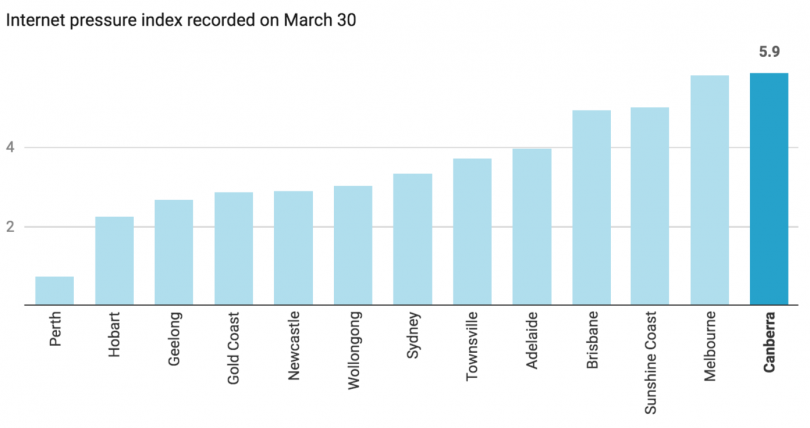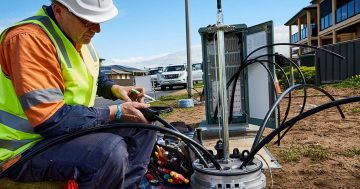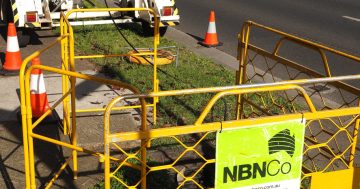
Joe Exotic, the central character of Netflix’s hit series Tiger King. Photo: Netflix.
Could it be that the highest trending series on Netflix about a gay man who kept tigers is driving Canberra’s thirst for internet and internet congestion as we stay at home and isolate because of the COVID-19 virus?
While there is anecdotal evidence that just about everyone with Netflix is binging, or has binged on the series Tiger King, research by Monash University and NBN Co shows that Canberra and Melbourne have been experiencing the worst average internet congestion in the country because we’re doing the right thing and working from home (although Tiger King may be on in the background).
Research by KASPR datahaus, which is linked to Monash University in Melbourne, assessed the internet congestion of Australia’s major cities from February to March 30.
The research showed there have been big spikes in bandwidth demand across Australia.
Canberra is seeing on average 5.9 per cent more congestion since the move to self-isolating, with Melbourne not far behind.
NBN Co has also launched a new weekly report that reveals significant increases in download peaks since the end of February.
The Australian Broadband Data Demand report shows the highest throughput (the measure of data flowing through the NBN access network) recorded in a week during three periods – daytime business hours, early evening hours and busy evening hours.
NBN Co’s chief residential customer officer Brad Whitcomb said video conferencing, video streaming and accessing cloud-based office applications were driving a large increase in data demand on the NBN network.
“As more people start to work and learn from home, we’ve seen a substantial increase in the peak throughput on our main wholesale service during the daytime business hours, early evening and busy evening periods,” Mr Whitcomb said.
He also said the network was continuing to perform well under the extra demand.
“Access to secure and resilient broadband is more important than ever for Australia’s business, education and entertainment needs and NBN Co seeks to support Australians during this time.”

Internet pressure in cities across Australia on 30 March. Source: KSPR datahaus.
Compared to the last week of February before social distancing measures were in effect, data demand on the NBN has grown significantly.
Data flow across the network during the first week of April in the evening busy hours (8:00 pm to 11:59 pm) had increased by 18 per cent. During the early evening hours (5:00 pm to 7:59 pm) it increased by 21 per cent. But the biggest increase had come during daytime business hours (8:00 am to 4:59 pm), where a 24 per cent increase has been recorded.
NBN CEO Stephen Rue said that while these increases are significant compared to their pre-COVID-19 benchmarks, they remain well within the capacity headroom built into the network.
“While this measures the difference between peaks, since social distancing measures were implemented, traffic on the NBN main wholesale service has also significantly grown with business hours usage increasing by more than 70 per cent,” Mr Rue said.
The Australian Government-owned corporation said it had been preparing for “this type of scenario” and had been watching the response from companies like Telecom Italia which recorded a 40 per cent increase in data consumption since the start of the coronavirus outbreak.
This comes as the federal government asked NBN Co and Australia’s five biggest retail service providers – Telstra, Optus, Vodafone Hutchison, TPG and Vocus – to form a special working group to maintain access to reliable, high-speed broadband for residential and business customers.
The group will share information, coordinate strategies to manage congestion and take other steps to address significant demand changes caused by the COVID-19 pandemic and the large numbers of people now at home during the day.
The first outcome has seen fees waived for additional capacity of up to 40 per cent to internet providers for at least three months.
The Australian Competition and Consumer Commission (ACCC) is an observer on the working group.
“Online services and connections are now more important than ever, as Australians seek to stay productive and engaged, undertake home-schooling, telehealth and access other services. The ability to do all this will also assist people to comply with increasingly strict social distancing measures,” ACCC Chair Rod Sims said.
















